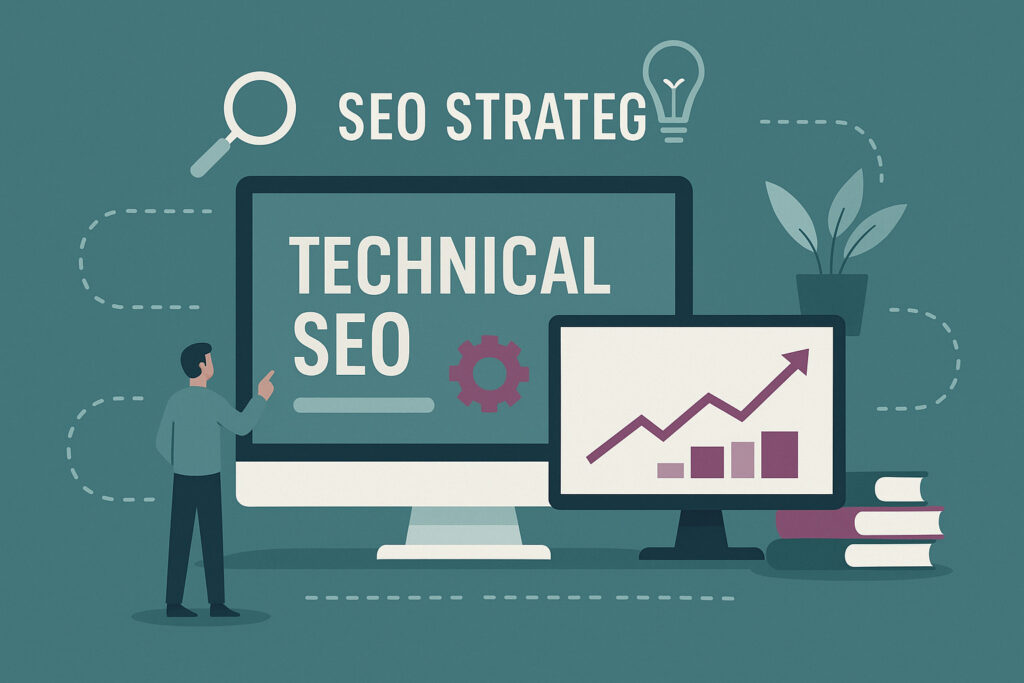What Is Technical SEO and How to Build an SEO Strategy in Tampa, Safety Harbor, Clearwater, FL, and the Surrounding Areas
If your business or organization has a website in Tampa, you’ve likely heard the phrase “technical SEO.” But what does it actually mean—and why does it matter?
Technical SEO might not sound as flashy as content creation or social media, but it’s the foundation of a strong SEO strategy. Without it, your website could be invisible to search engines, slow to load, and vulnerable to cyberattacks. That’s why it’s critical to understand what technical SEO is and how it fits into your broader marketing efforts.
Many people in Tampa, Safety Harbor, and Clearwater, FL have asked this question—even if they phrase it differently. Maybe you’ve asked one of these:
- What is technical SEO?
- Why isn’t my website ranking?
- Do I need a sitemap?
- Is my site secure enough for Google?
- How do I fix my slow website?
 In This Article…
In This Article…
In this article, we’ll define technical SEO, explain why it matters for search visibility, and show you the steps we take at Skyway Web Design and Marketing to build a rock-solid SEO strategy—starting with the technical foundation.
What Is Technical SEO?
Technical SEO refers to the behind-the-scenes elements of your website that help search engines find, crawl, understand, and index your pages. Unlike content or link-building, technical SEO focuses on site infrastructure, code, and server optimization, and it is an absolutely essential part of a good SEO strategy.
Key Elements of Technical SEO:
- Indexability: Making sure your website’s pages can be found and read by search engines. Files like robots.txt and meta tags can unintentionally block important pages. If your pages aren’t indexable, they won’t appear in search results—period. One common issue is accidentally applying “noindex” tags to pages you want to rank. It’s also easy to misconfigure robots.txt, preventing search engines from crawling your entire site. Ensuring proper indexability allows your valuable content to be seen and ranked appropriately by Google and other engines.
- Sitemap: A sitemap tells search engines which pages exist on your site and should be indexed. While it doesn’t guarantee indexing, a clean and structured sitemap acts like a roadmap, guiding bots to the most important content. If your sitemap includes broken links or outdated pages, it may confuse search engines or delay indexing altogether. Keeping it updated with new, high-priority pages is essential for effective crawling and improved visibility in search results. Your seo strategy should include regularly checking and updating your sitemap or having a plugin that does it for you automatically.
- Security: Having an SSL certificate (HTTPS) is essential. Why is an SSL certificate part of technical SEO? It not only protects your website and your visitors’ data but is also a known Google ranking factor. Sites without HTTPS may be flagged as “Not Secure” by browsers, which can reduce trust and cause users to bounce. Additionally, insecure websites are more vulnerable to hacking and malware, which can lead to being blacklisted by search engines altogether. Transitioning to HTTPS is now a non-negotiable part of any SEO strategy.
- Page Speed: Google prioritizes fast-loading websites because slow sites frustrate users. Page speed directly affects bounce rates and conversion rates. Heavy images, unminified code, too many plugins, and low-quality hosting are some of the most common culprits. A slow site will not only rank lower but also risk losing visitors before your content even loads. Use tools like Google PageSpeed Insights or GTmetrix to identify problem areas and optimize for faster load times. Good page speed isn’t just good technical SEO; it’s a good user experience.
- Core Web Vitals: These are specific metrics Google uses to evaluate user experience: Largest Contentful Paint (LCP), First Input Delay (FID), and Cumulative Layout Shift (CLS). Poor performance in any of these areas can hurt your rankings, even if your content is great. A page that loads slowly or shifts layout elements mid-load creates a frustrating experience. Optimizing your site to meet Google’s thresholds for Core Web Vitals helps ensure better rankings, better engagement, and better business results.
“Technical SEO is the process of ensuring that a website meets the technical requirements of modern search engines with the goal of improved organic rankings.” —
Backlinko
“Technical SEO covers all of the technical aspects of your website that affect SEO, from hosting and site speed to XML sitemaps and meta robots tags.” —
Search Engine Journal
Why Technical SEO Matters
More than half of all website traffic comes from mobile devices, and search engines use hundreds of ranking signals, including many technical ones. If your website isn’t optimized technically, you’re not only giving users a poor experience—you’re telling Google you’re not trustworthy.
Common Technical SEO Mistakes
- Missing or outdated sitemaps
- Pages blocked by robots.txt or noindex tags
- Non-secure HTTP instead of HTTPS
- Slow load times due to bloated code or uncompressed media
- Poor mobile responsiveness
 What We Do at Skyway
What We Do at Skyway
When a new client joins our SEO program, the first thing we do is a technical SEO audit. We analyze every element—crawlability, indexation, speed, structure, and more. Then we fix what’s broken and lay the groundwork for future growth.
If you live in Tampa, Safety Harbor, Clearwater, FL, or the surrounding areas and you’re looking for a company that can improve your technical SEO, we’d love to talk.
We provide SEO strategy services to help you grow your business, improve visibility, and attract more leads.
Skyway Website Design and Marketing Services
Skyway is a technical SEO agency serving Tampa, Safety Harbor, Clearwater, FL, and the surrounding areas. Contact us today for Web Design in Tampa or to build a results-driven SEO strategy for your organization.

President at Skyway Web Design & Marketing
Mark has served as the President of Skyway Web Design & Marketing since its founding and has lived in the Tampa area for most of his life.
In his role, Mark oversees the Custom Website and Sales departments, bringing expertise to hundreds of custom website, graphic design, and marketing projects for businesses, churches, non-profits, and schools.
Beyond his professional work, Mark is deeply involved in his community, coordinating and packing over 700 meals each week for children through One Community Now’s Pack A Sack for Kids program.

